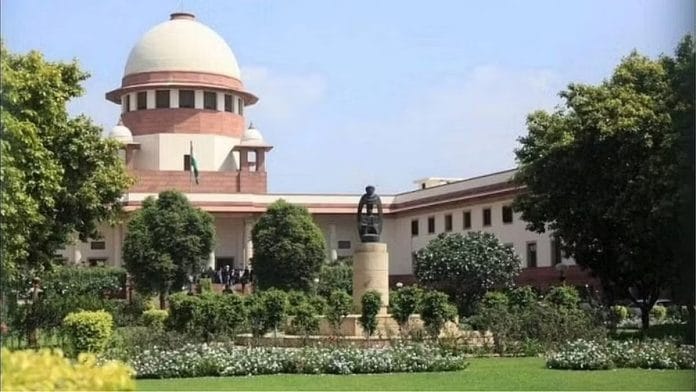New Delhi: Can a Muslim seek a declaration that she is a non-believer in Islam, refuse to be governed by the Sharia law when it comes to inheritance rights, and take protection under the secular law — the Indian Succession Act, 1925 — which specifically bars members of the community from availing its benefits?
A 50-year-old woman from Kerala has raised this important question before the Supreme Court.
The woman does not want to be governed by Sharia Law, which she characterises as “anti-woman”, and has approached the top court with a request to declare her a non-practising Muslim. She also wants the court to allow her to avail legal remedies for inheritance under the secular 1925 law.
There are two sections in Sharia that detail succession rights among Muslims. Under Section 3 of the Muslim Personal Law (Sharia) Application Act, 1937, if a member of the Muslim community wants to be a beneficiary of his/her family property via wills and legacies, then such a person has to seek a declaration from a prescribed authority about being a practising Muslim.
Intestate succession is also practised in the Muslim community in accordance with Section 2 of the 1937 act, which is applicable regardless of whether or not someone has sought a declaration. Either way, a Muslim woman cannot inherit more than one-third of her family property.
In case a couple has a daughter as their only child, then she is entitled to receive 50 percent of her parents’ property, while the remaining 50 percent devolves to a male member of the family, which according to the succession line given in the act has the mother’s brother on top of the list, followed by the father’s brothers and sisters.
Safiya P.M., who has approached the court, is the general secretary of an organisation called the ex-Muslims of Kerala. According to her, Sharia law is discriminatory against women of the community. Hence, she does not want to be governed by it for any matters listed in sections 2 and 3 and wants a declaration that she is a non-believer Muslim.
But, as her advocate Prashant Padmanabhan pointed out, the declaration would create another legal conundrum for Safiya because it would make her lose her inheritance rights in her father’s property. Furthermore, it would also deny her daughter — the only child — from getting Safiya’s property as the sole inheritor.
Though the Indian Succession Act, 1925 is a secular law, section 58 specifically exempts its application over Muslims in India. Padmanabhan said this created a void because she could not seek civil remedy under this law.
“Safiya wants to bequeath her entire property to her only daughter, and as per Sharia law she can only get 50 percent of the property,” Padmanabhan explained.
“Therefore, in her petition, she has made an additional prayer, which is to let her have the right to bequeath her property as per the Indian Succession Act, 1925. In case she dies, her daughter must succeed her property as per the secular law,” he said.
Safiya’s petition was heard Monday by a bench led by Chief Justice D.Y. Chandrachud, which at the outset was reluctant to entertain her plea. Later, the bench agreed to look into the argument over Safiya’s fundamental right to “believe or not believe” in her religion and asked Attorney-General R. Venkataramani to nominate a law officer who would assist the judges in the matter. The court will hear the case again in the second week of July 2024.
“The moment you are born as a Muslim you are governed by the personal law. Your rights or entitlement are not governed by being a believer or non-believer,” the bench told Padmanabhan, also wondering how the court could give a declaration regarding non-applicability of personal law, when she has not challenged any statutory provision.
Padmanabhan told the bench that his client’s father was also a non-believer and that her brother, who is suffering from Down Syndrome, would inherit two-thirds of the property. “This would go waste as the petitioner will have to manage everything, without having any access to the properties named after her brother. Property earmarked for her brother will remain unutilised,” Padmanabhan said.
The lawyer told the court it has wide powers to declare a citizen a non-believer. Safiya’s petition has cited an instance from Tamil Nadu where an advocate practising in the Madras High Court received a certificate from the tehsildar of Tirupattur Circle & City, declaring her to be a non-believer.
Padmanabhan also informed the bench that Section 58 of the Indian Succession Act was already under challenge before the Supreme Court. Filed in 2016, this petition challenges the arbitrary exemption of Muslims from invoking the secular law. He said that Safiya has been allowed to implead in the matter as a petitioner.
Speaking to ThePrint, he said: “Notwithstanding a declaration, Section 58 denies all Muslims the benefit of the secular succession law.”
Note: An earlier version of this report identified the petitioner as U.A. Muhammed. The error is regretted.
(Edited by Tikli Basu)
Also read: Indian Muslim women need UCC. It challenges power of self-appointed judicial bodies






